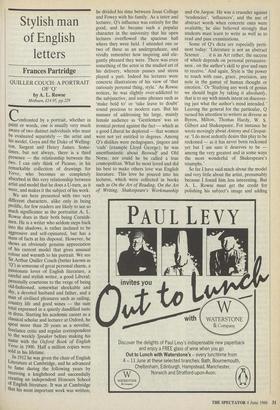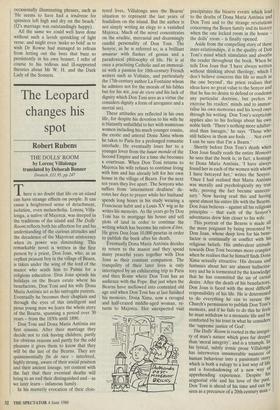Stylish man of English letters
Frances Partridge
QUILLER COUCH: A PORTRAIT OF `Q' by A. L. Rowse
Methuen, £14.95, pp.229
Confronted by a portrait, whether in paint or words, one is usually very much aware of two distinct individuals who must be evaluated separately — the artist and his model, Goya and the Duke of Welling- ton, Sargent and Henry James. Some- times, but not always, there is a third Presence — the relationship between the two. I can only think of Picasso, in his remarkable collection of drawings for Verve, who becomes so completely absorbed in this very relationship between artist and model that he does a U-turn, as it were, and makes it the subject of his work.
. We are here presented with two very different characters, alike only in being Prolific, for few readers are likely to see so much significance as the portraitist A. L. Rowse does in their both being Cornish- men. He is a writer who seldom steps back into the shadows, is rather inclined to be aggressive and self-opiniated, but has a mass of facts at his disposal. However, he Shows an obviously genuine appreciation of his current model that gives unusual colour and warmth to his portrait. We see Sir Arthur Quiller Couch (better known as `Q') as someone of great personal charm, a Passionate lover of English literature, a careful and stylish writer, a good Liberal; Personally courteous to the verge of being old-fashioned, somewhat shockable and shy, a devoted husband and father, and a man of civilised pleasures such as sailing, country life and good wines — the sum total expressed in a quietly dandified taste in dress. Starting his academic career as a classical scholar and lecturer at Oxford, he Spent more than 20 years as a novelist, freelance critic and regular correspondent to the weekly Speaker before making his name with the Oxford Book of English Verse in 1900. Half a million copies were sold in his lifetime.
In 1912 he was given the chair of English Literature at Cambridge, and he advanced to fame during the following years by receiving a knighthood and successfully creating an independent Honours School of English literature. It was at Cambridge that his most important work was written; he divided his time between Jesus College and Fowey with his family. As a tutor and lecturer, Q's influence was entirely for the good, and he became such a popular character in the university that his open lectures overflowed the spacious hall where they were held. I attended one or two of these as an undergraduate, and vividly remember how inspiring and ele- gantly phrased they were. There was even something of the actor in the studied art of his delivery, wherein pauses and stress played a part. Indeed his lectures were concrete illustrations of his view of 'that curiously personal thing, style.' As Rowse notices, he was slightly over-addicted to the subjunctive, and some phrases such as 'make bold to' or 'take leave to doubt' sound precious to modern ears. But his manner of addressing his large, mainly female audience as 'Gentlemen' was an ironical protest against the fact — which as a good Liberal he deplored — that women were not yet entitled to degrees. Among Q's dislikes were pedagogues, jingoes and 'cads' (example Lloyd George); he was unenthusiastic about Beowulf and Old Norse, nor could he be called a true cosmopolitan. What he most loved and did his best to make others love was English literature. This love he poured into his lectures, which were collected in books such as On the Art of Reading, On the Art of Writing, Shakespeare's Workmanship and On Jargon. He was a crusader against 'tendencies', 'influences', and the use of abstract words when concrete ones were available; he also believed strongly that students must learn to write as well as to read and pass examinations.
Some of Q's dicta are especially perti- nent today: 'Literature is not an abstract Science . . . it is an Art rather, the success of which depends on personal persuasive- ness , on the author's skill to give and ours to receive.' And again, Style is 'the power to touch with ease, grace, precision, any note in the gamut of human thought or emotion.' Or 'Studying any work of genius we should begin by taking it absolutely, that is to say with minds intent on discover- ing just what the author's mind intended.' Leaving the general for the particular, Q turned his attention to writers as diverse as Byron, Milton, Thomas Hardy, W. S. Gilbert and Shakespeare. For instance he wrote movingly about Antony and Cleopat- ra: 'I do most ardently desire this play to be reckoned — as it has never been reckoned yet but I am sure it deserves to be — among the very greatest and in some ways the most wonderful of Shakespeare's triumphs.'
So far I have said much about the model and very little about the artist, presumably because I found him less interesting. But A. L. Rowse must get the credit for polishing his subject's image and adding
occasionally illuminating phrases, such as 'He seems to have had a tendresse for spinsters left high and dry on the beach.' (0's marriage was outstandingly happy).
All the same we could well have done without such a lavish sprinkling of light verse: and might even 'make so bold' as to wish Dr Rowse had managed to refrain from letting out the bees that buzz so persistently in his own bonnet. I refer of course to his tedious and ill-supported theories about Mr W. H. and the Dark Lady of the Sonnets.



















































 Previous page
Previous page